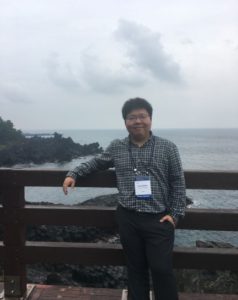 Prof. Shuao Wang received his B.S. from University of Science and Technology of China (2007) and Ph.D. from University of Notre Dame (2012). After conducting the postdoc research at Lawrence Berkeley National Lab and University of California, Berkeley, he became a professor and the director of Center of the Nuclear Environmental Chemistry at Soochow University, China (2013). Prof. Wang has published more than 140 journal articles with a H-index of 35, and two book chapters in radiochemistry. He is the recipient of the Young Investigator Award from American Chemical Society, Division of Inorganic Chemistry in 2012, the Young Chemist Award from Chinese Chemical Society in 2016, and the National Science Fund for Distinguished Young Scholars from National Science Foundation of China in 2018. The research of his group involves in the areas of solid state chemistry, materials chemistry, separation chemistry, and environmental chemistry of the key radionuclides in the nuclear fuel cycle.
Prof. Shuao Wang received his B.S. from University of Science and Technology of China (2007) and Ph.D. from University of Notre Dame (2012). After conducting the postdoc research at Lawrence Berkeley National Lab and University of California, Berkeley, he became a professor and the director of Center of the Nuclear Environmental Chemistry at Soochow University, China (2013). Prof. Wang has published more than 140 journal articles with a H-index of 35, and two book chapters in radiochemistry. He is the recipient of the Young Investigator Award from American Chemical Society, Division of Inorganic Chemistry in 2012, the Young Chemist Award from Chinese Chemical Society in 2016, and the National Science Fund for Distinguished Young Scholars from National Science Foundation of China in 2018. The research of his group involves in the areas of solid state chemistry, materials chemistry, separation chemistry, and environmental chemistry of the key radionuclides in the nuclear fuel cycle.
Read his Emerging Investigator article “Significantly enhanced uptake of Eu3+ on a nanoporous zeolitic mineral in the presence of UO22+: Insights into the impact of cation-cation interaction on the geochemical behavior of lanthanides and actinides” and find out more about him in the interview below:
Your recent Emerging Investigator Series paper focuses on the impact of cation-cation interaction on the geochemical behaviour of lanthanides and actinides. How has your research evolved from your first article to this most recent article?
My first article was published ten years ago during my PhD study under the supervision of Prof. Thomas Albrecht-Schmitt at the University of Notre Dame, which documented the first chemical synthesis and characterizations of transuranic element (neptunium and plutonium) borate compounds. This research made me fall in love with the research of chemistry of radioactive elements. During the past five years of my independent career at Soochow University in China, my group has been focused on the materials chemistry, separation chemistry, and environmental chemistry of the key radionuclides in the nuclear fuel cycle, aiming at overcoming several critical scientific challenges on used nuclear fuel repossessing, nuclear waste disposal, and nuclear accident responses. These researches are in a more practical manner, in comparison with those purely curiosity-driven researches in radiochemistry during my PhD and postdoc periods in US.
What aspect of your work are you most excited about at the moment?
Some of the materials and strategies developed by us have found practical applications in the environmental radioactive remediation, used nuclear fuel partitioning, waste geological disposal, and emergency responses during the nuclear accidents.
In your opinion, what are the most important questions to be asked/answered in this field of research?
In either nuclear fuel cycle or environment relevant to the nuclear waste disposal, the chemical systems are extremely complicated often with the combined conditions of high acidity/alkalinity, strong radiation field, and huge excess of coexisting cations/anions (high ionic strength). How to design functional materials with sufficient stabilities to survive from these conditions and at the same time can selectively recognize specific radionuclides is significantly challenging and remains highly desirable to be explored in both scientific and technique manners.
What do you find most challenging about your research?
The critical challenge of our research is the chemical complexity of the radioactive elements in nature especially actinides (i.e. chemical bonding, redox chemistry, coordination etc.), the scarcity of related researches owing to the operational limitation on radioactive substances, combined with the chemical system complexity we are looking at.
In which upcoming conferences or events may our readers meet you?
I will attend the 2019 Orlando ACS meeting (March 31- April 4) and give a talk on our recent works in the Seaborg Award Symposium in honor of Prof. Thomas Albrecht-Schmitt.
How do you spend your spare time?
Hiking, reading, and video gaming sometimes.
Which profession would you choose if you were not a scientist?
Maybe a video game designer or a singer.
Can you share one piece of career-related advice or wisdom with other early career scientists?
Choose the most challenging topic in your field to study, devote as much time as you can, and publish your results in the most suitable journals that attract the right reader communities in your early career.










